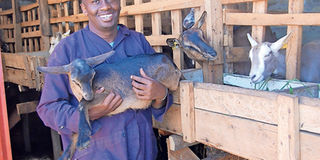A model dairy goat farm

Dairy goat breeder, Francis Ngumo in his farm in Njoro, Nakuru County. He started the agribusiness in 2017 with 20 goats after investing Sh250,000 and now keeps German alpine and Toggenburg breeds. PHOTO | FRANCIS MUREITHI | NATION MEDIA GROUP
What you need to know:
- Ngumo, 37, is not only an emerging goat breeder in the region, but he is also turning his farm into a training ground for beginners.
- Their spacious pens are raised about a metre from the ground and well-ventilated, with a wood floor whose pieces are separated to allow droppings to fall onto the ground.
- The kids should also be kept and fed separately with more supplements and a lot of soya as they need energy and protein to grow faster.
- His main focus is breeding the animals for sale, with a goat kid going for between Sh15,000 and Sh20,000. He uses his bucks to breed the animals.
A potholed earth road that snakes through Kenyatta in Njoro sub-county, some 16km from Nakuru town, makes for a rough ride, even when one is using a motorbike. Our destination is Francis Ngumo’s one-acre farm where he rears goats.
Ngumo, 37, is not only an emerging goat breeder in the region, but he is also turning his farm into a training ground for beginners.
He started the agribusiness in 2017 with 20 goats after investing Sh250,000 and now keeps German alpine and Toggenburg breeds, which stand out on the farm due to their distinctively brown and white colours.
They are sparkling clean, well-fed and some are in-calf. The goats have trimmed horns and weigh between 30kg and 40kg, according to records he dutifully keeps.
Their spacious pens are raised about a metre from the ground and well-ventilated, with a wood floor whose pieces are separated to allow droppings to fall onto the ground.
Ngumo uses the droppings to make biogas that he uses to cook and heat water at home. The slurry ends up on the farm as fertiliser to grow napier grass and vegetables such as sukuma wiki.
“For good goat keeping, the animals should be kept according to their ages or state. Those that are pregnant and those that I am milking should be kept and fed separately,” says Ngumo.
The kids should also be kept and fed separately with more supplements and a lot of soya as they need energy and protein to grow faster.
“We give the kids 30 per cent of maize germ for energy and 70 per cent cotton seed cake for protein. We separate the kids from their mothers after two weeks and feed them milk to reduce over-sucking. The separation helps the mother to get time to eat and boost milk production,” says the farmer, who holds a Bachelor of Science degree in Geographic Information Systems (GIS) from the University of Twente in the Netherlands.
Ngumo, who currently keeps 20 animals after selling others, is slowly phasing out the alpines and replacing them with the Toggenburgs because the former are many in the region, a fact that has resulted in interbreeding.
HAVE THE BEST GENETIC MATERIAL
“I have a passion for dairy goat farming because my parents reared goats in Njoro. I grew up with the animals,” says Ngumo, who keeps records on artificial insemination, birth, diseases and milk production, among others.
His main focus is breeding the animals for sale, with a goat kid going for between Sh15,000 and Sh20,000. He uses his bucks to breed the animals.
“Last December I sold 10 goats, some that went up to Sh30,000 each. The secret in this business is investing in quality breeds.”
Out of his 20 dairy goats, he is currently milking three does and the rest are in-calf. He gets an average of six litres of milk daily from each and sells a litre at between Sh100 and Sh120.
He charges Sh1,000 for farmers who visit his farm for lessons on goat-keeping. Ngumo says he also holds training every second and last Saturday of the month.
One of his biggest challenges, he says, is poor commercial feeds and substandard minerals, which affect milk production, adding he will start making his own to be assured of quality and cut costs.
Dr Douglas Indeche, an animal health expert at the Kenya Agricultural Research and Livestock Organisation (Karlo), says to get maximum returns, farmers should buy animals from accredited sources.
“You need to have the best genetic material from a breeder who has done proper selection and has registered his animals, has records of diseases, lineage, date of birth and milk production, among other factors.”
According to him, dairy goats are very sensitive and therefore vaccination is critical.
“The houses should shield the animals from wind, direct sunlight and rain and must have adequate resting area if they are to produce more milk,” says Dr Indeche, who is also an animal breeder and nutritionist.
****
Get it fast
Record keeping, goat associations
- One benefits a lot from membership of the Dairy Goats Association of Kenya (DGAK).
- Every goat must have a record card where their personal details are recorded.
- The card should contain the name of the goat, date of birth, name of the breeder, the tattoo number, birth weight, volume number, weaning weight, the place of birth, farmer’s group code and the dam’s name.




